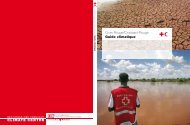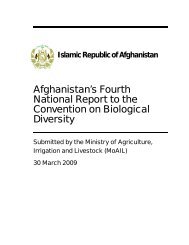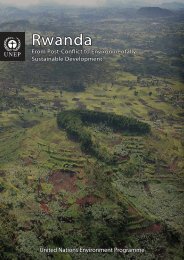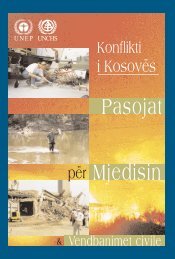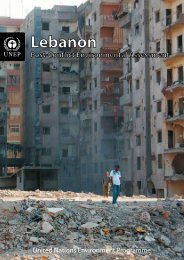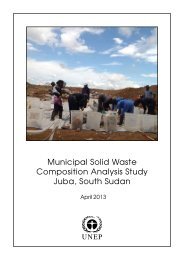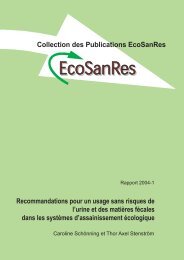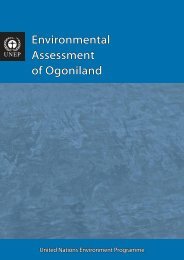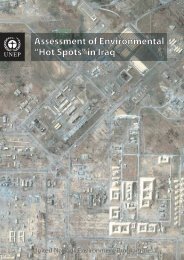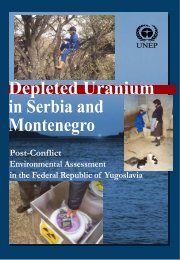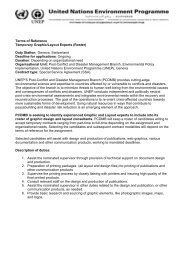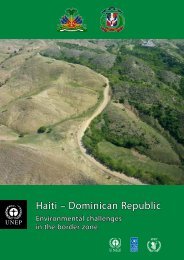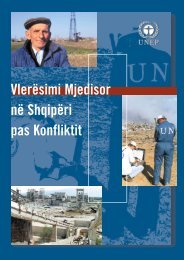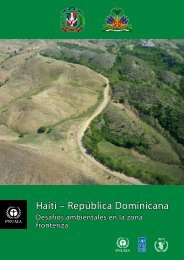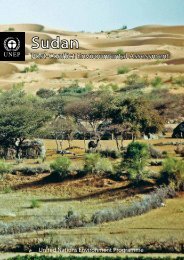Strengthening capacity - Disasters and Conflicts - UNEP
Strengthening capacity - Disasters and Conflicts - UNEP
Strengthening capacity - Disasters and Conflicts - UNEP
Create successful ePaper yourself
Turn your PDF publications into a flip-book with our unique Google optimized e-Paper software.
as well as disaster <strong>and</strong> climate risks to livelihoodsustaining<br />
natural resources. 17<br />
Focus on existing grievances: For quick results<br />
delivery, it is more productive to focus on existing<br />
grievances over prior environmental policies as a<br />
priority issue.<br />
Analyze the economics of petty corruption: It<br />
can be helpful to analyze the economics of petty<br />
corruption as it relates to water provision or<br />
other types of service delivery, equipment/finance<br />
for community-based resource management<br />
projects <strong>and</strong> the construction of environmental<br />
infrastructure projects. Identify any opportunities<br />
for monopoly power <strong>and</strong> abuse of discretion by<br />
government employees.<br />
6.2 Exploring <strong>and</strong> designing<br />
options to address resource<br />
conflicts <strong>and</strong> prevent violence<br />
Explore the legal framework:<br />
o<br />
o<br />
o<br />
Agency/ministry m<strong>and</strong>ates: Is<br />
environmental protection written into all<br />
relevant government agency m<strong>and</strong>ates Are<br />
the m<strong>and</strong>ates of different arms of government<br />
clear And, are there areas where different<br />
parts of the government have overlapping<br />
authority over a resource If multiple parts<br />
of government regulate different uses of a<br />
river or forest, for example, then multiple<br />
government actors may need to participate in<br />
some policy discussions.<br />
Administrative accountability: Is there a<br />
legal framework for all agency procedures<br />
that enforces transparency <strong>and</strong> inclusiveness<br />
by regulating agency actions Does it give all<br />
people, including formerly disempowered<br />
groups, a right to information about agency<br />
decisions, input into those decisions, <strong>and</strong><br />
a systemic ability to enforce their rights by<br />
blocking unlawful agency action<br />
Freedom of information: Do freedom of<br />
information laws make it possible for civil<br />
society to gain access to regulations, permit<br />
records, <strong>and</strong> environmental data<br />
Support dialogue efforts to resolve resource<br />
conflicts <strong>and</strong> build consensus:<br />
o<br />
o<br />
o<br />
o<br />
o<br />
Public inclusion <strong>and</strong> local community<br />
engagement: Help government staff learn<br />
how to communicate more effectively<br />
with the public, <strong>and</strong> provide adequate<br />
opportunities for broad consultation <strong>and</strong><br />
participation in decision-making. Assist<br />
the government in: first, soliciting priorities<br />
from communities (especially with respect<br />
to investments in water <strong>and</strong> agricultural<br />
infrastructure); <strong>and</strong>, second, assessing<br />
knowledge gaps at the community level that<br />
must be addressed if community-based water,<br />
pasture, fisheries <strong>and</strong> forestry management<br />
are to succeed.<br />
Intra-governmental relations: If there is an<br />
environment agency, external actors can help<br />
it to improve critical relationships with more<br />
powerful government ministries (agriculture,<br />
minerals, water, industry, trade).<br />
Inter-governmental relations: Help the<br />
government to develop an underst<strong>and</strong>ing of<br />
regional environmental challenges <strong>and</strong> the<br />
institutions necessary to address them.<br />
Peacebuilding capacities: Provide training<br />
to potentially conflicting groups in advocacy,<br />
negotiation, analysis, <strong>and</strong> dialogue skills such<br />
as active listening, at first in order to facilitate<br />
their engagement in participatory decisionmaking<br />
processes, <strong>and</strong> later to ensure that<br />
communities are able to resolve many of their<br />
own conflicts without intrusive government<br />
involvement.<br />
Sharing best practices: Share knowledge<br />
from other countries of how similar<br />
governments <strong>and</strong> civil society organisations<br />
have dealt with problems, such as: community<br />
involvement in protected areas; integrated<br />
water resources management; communitybased<br />
forestry; <strong>and</strong>, management for nontimber<br />
forest products, agricultural extension<br />
STRENGTHENING CAPACITY FOR CONFLICT-<br />
SENSITIVE NATURAL RESOURCE MANAGEMENT 25



